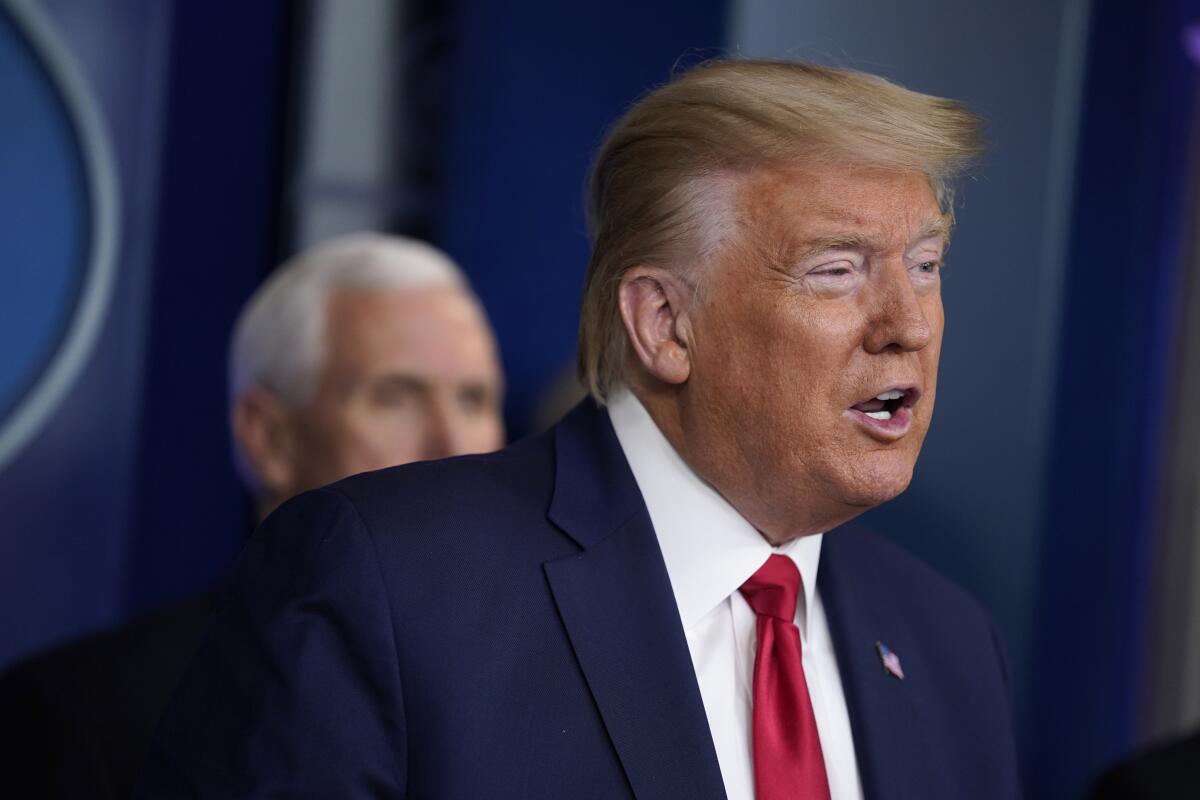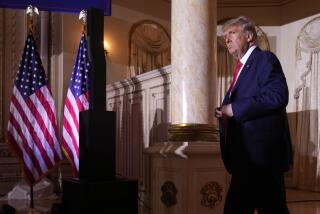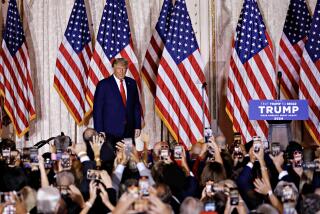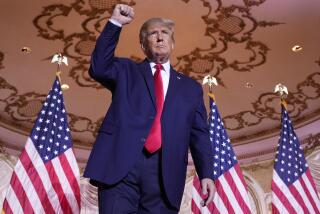Belatedly battling the coronavirus, Trump tries to save the country — and his reelection campaign

- Share via
WASHINGTON — President Trump has boasted for months that the booming stock market, low unemployment and strong economy leave Americans “no choice” but to give him a second term in November — “whether you love me or hate me.”
But Wednesday, after another dismal day on Wall Street briefly knocked stocks down to levels last seen since before he was inaugurated in 2017, Trump declared himself a “wartime president” — an acknowledgment both of the deepening coronavirus crisis that he had shrugged off as recently as last weekend, but also of the alarm bells ringing in his reelection campaign.
One Trump ally likened the nation’s upheaval to “an asteroid,” an unforeseen and devastating event that has upended months of planning and left the campaign operation, its supportive super PAC and the Republican National Committee apparatus “in a holding pattern” as former Vice President Joe Biden appears on track to locking up the Democratic nomination.
Trump’s campaign has suspended in-person efforts to register voters, given the risk of spreading the contagion. His raucous campaign rallies, the symbol of the Trump political phenomenon, are on hiatus. So are the campaign’s TV ads.
But unless the pandemic peaks soon and the economy recovers, and Trump can convince voters that he successfully led the ship of state in a time of grave peril, his central argument for reelection may be another victim of the coronavirus.
It “obviously undercuts the president’s ability to talk about his success with the economy and with Wall Street, and it creates lots of fear and worry and discomfort,” said Stuart Rothenberg, a veteran political analyst in Washington who changed his forecast of the 2020 presidential election on Wednesday from “tossup” to “leans Democratic.”
Democrats have also largely given up normal campaigning. But after shellacking Vermont Sen. Bernie Sanders in the Arizona, Florida and Illinois primaries on Tuesday, Biden moved swiftly to a general election footing, contrasting himself with Trump and suggesting his years of experience would provide far steadier leadership.
Americans, Biden said in a statement, “deserve a partner” in the White House.
Tim Murtaugh, communications director for the Trump campaign, touted Trump’s record on the economy in a text message Wednesday, asserting “he’s the best one to lead us through this.”
“Joe Biden threatens to weaken all of the strong underpinnings President Trump has put into place,” he wrote.
To make that case, Trump appears to have disavowed his 2016 pledge that “I alone can fix” America’s problems. On Friday, when asked about the administration’s failure to deliver tests for the virus, he said, “No, I don’t take responsibility at all.”
That not-my-fault approach hasn’t helped his political prospects.
A Pew Research poll released Wednesday showed 52% of American adults believe Trump has not taken the risks from the outbreak seriously enough, while 37% say he has assessed the risks correctly. Those numbers could change, as some of the poll was taken before Trump’s recent shift toward a more somber tone.
Trump, who has graded his response to coronavirus a “10,” initially dismissed the disease as a political “hoax” pumped up by his opponents and blamed the media for spooking Wall Street. As recently as Sunday, he claimed the virus was under “tremendous control” and urged Americans to “just relax.”
But with Wall Street cratering, most school systems and colleges closed, shops and businesses shuttered, and tens of millions of Americans sheltering in place, working from home, or newly out of work, Trump abruptly shifted course this week.
On Monday, he urged people not to travel, to avoid restaurants and food courts, and to shun gatherings of more than 10 people. On Tuesday, he claimed he knew it was a pandemic long before the experts did.
And on Wednesday, Trump cast himself as a “wartime president,” invoking the sacrifices Americans made during World War II and asking them to absorb pain and inconvenience until the battle is won.
“It’s a very tough situation,” he said at the White House. “You have to do things, you have to close parts of an economy that six weeks ago was the best we ever had.”
Notwithstanding Trump’s hyperbole, the economy is usually key for incumbent presidents. It may be more so for Trump.
Despite strong growth and a record-setting stock market until a month ago, his approval rating remained stuck in the low 40s largely because many educated white voters, especially women in the suburbs, are turned off by his language and behavior. His campaign hoped to win this year by persuading voters that his Democratic opponent would squander the economic gains.
As the pandemic has worsened — more than 7,300 coronavirus cases were confirmed across the country Wednesday — Trump has taken to giving daily press briefings at the White House, some running an hour or more. He appears supremely self-confident, but his off-the-cuff comments often contradict the sobering warnings of public health professionals.
Polls show Americans have far more trust in Dr. Anthony Fauci, who heads the National Institute of Allergy and Infectious Diseases, than in the president. After Trump recently suggested a vaccine was imminent, Fauci countered that it would be 12 to 18 months “at the earliest.” And after Trump gave another rosy prediction Sunday, Fauci warned that “the worst is yet ahead.”
Trump is hoping that a $1-trillion-plus economic stimulus, including direct cash payments to most Americans, will cushion the economic blow if he reaches a deal with Congress this week. On Tuesday, Treasury Secretary Steven T. Mnuchin reportedly warned Republican senators that unemployment could spike to 20% — the worst since the Great Depression in the 1930s — unless Congress acts.
Trump is also hoping to exploit partisan and cultural divisions, as he did in his 2016 win and has continued to do ever since. But that could be more difficult amid calls, including his own, for the country to unite during the crisis.
The Pew survey showed a sharp divide in how Americans view the virus, with Democrats viewing it with much more alarm than Republicans.
Rothenberg said it’s too early to assess how the coronavirus will affect the general election race.
The vast disruptions in the nation’s social and economic fabric might provide an advantage for a traditional incumbent — Abraham Lincoln was reelected during the Civil War and Franklin D. Roosevelt won reelection three times during the Great Depression and World War II. But they could be difficult for Trump to overcome.
“We have had elections during wars and during depressions,” Rothenberg said. “Often we look to the incumbent who is experienced and poised, stable and safe. Donald Trump is almost never the safe choice. It’s hard for me to see at some point in the future that people are going to say, ‘Donald Trump did such a great job, now we can turn to him in times of high anxiety and chaos.’”
More to Read
Get the L.A. Times Politics newsletter
Deeply reported insights into legislation, politics and policy from Sacramento, Washington and beyond. In your inbox twice per week.
You may occasionally receive promotional content from the Los Angeles Times.












